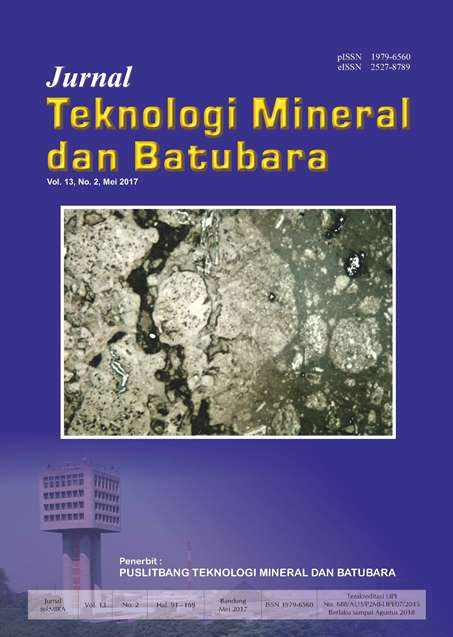STUDI KINETIKA PENGHILANGAN AIR KRISTAL LIMONIT MENJADI HEMATIT PADA ATMOSFER INERT
DOI:
https://doi.org/10.30556/jtmb.Vol13.No2.2017.204Kata Kunci:
bijih laterit, limonit, tudung besi, hematit, air kristal, kinetikaAbstrak
Kebutuhan besi baja untuk pembangunan di Indonesia selalu meningkat dari tahun ke tahun. Untuk itu, perlu dicari alternatif bahan baku lokal pembuatan pelet di antaranya pemanfaatan mineral limonit dengan mengubahnya menjadi mineral hematit dan dilanjutkan dengan proses konsentrasi, sehingga memiliki kandungan Fe yang lebih tinggi. Dalam penelitian ini dilakukan penghilangan air kristal bijih limonit dan mengubahnya menjadi hematit. Percobaan dilakukan pada temperatur 250, 300, 350, 450 dan 500˚C, selama 60 menit dengan suplai nitrogen 1 liter/menit. Hasil percobaan menunjukkan temperatur proses optimal adalah 350˚C dengan % Berat percontoh yang hilang 11,3% dan meningkatkan kadar Fe total dari 50 hingga 56,4%. Produk ini belum memenuhi persyaratan sebagai bahan baku pelet. Dari hasil studi kinetika penghilangan air kristal mineral limonit ini, reaksi pengubahan mineral limonit menjadi hematit terkendali oleh proses difusi pada temperatur 250oC dan 300oC.
Referensi
Astuti, W., Zulhan, Z., Shofi, A., Isnugroho, K., Nurjaman, F. and Prasetyo, E. (2015) “Pembuatan nickel pig iron (NPI) dari bijih nikel laterit Indonesia menggunakan mini blast furnace,” in Prosiding Seminar InSINaS 2012. Lembaga Ilmu Pengetahuan Indonesia, pp. 66–71.
Das, S., Hendry, M. J. and Essilfie-Dughan, J. (2011) “Transformation of two-line ferrihydrite to goethite and hematite as a function of pH and temperature,” Environmental Science & Technology, 45(1), pp. 268–275. doi: 10.1021/es101903y.
Dzemua, G. L. and Gleeson, S. A. (2012) “Petrography, mineralogy, and geochemistry of the Nkamouna serpentinite: implications for the formation of the cobalt-manganese laterite deposit, Southeast Cameroon,” Economic Geology, 107(1), pp. 25–41. doi: 10.2113/econgeo.107.1.25.
Elias, M. (2013) Nickel laterites in South East Asia, East Asia: Geology, Exploration Technologies and Mines. Bali: CSA Global.
Epikhin, A. N. and Krylova, A. V. (2003) “No Title,” Russian Journal of Applied Chemistry, 76(1), pp. 20–22. doi: 10.1023/A:1023371228302.
Ezhov, A. M. and Shvaljov, Y. B. (2015) “Dry Magnetic Separation of Iron Ore of the Bakchar Deposit,” Procedia Chemistry, 15, pp. 160–166. doi: 10.1016/j.proche.2015.10.026.
de Faria, D. L. A. and Lopes, F. N. (2007) “Heated goethite and natural hematite: Can Raman spectroscopy be used to differentiate them?,” Vibrational Spectroscopy, 45(2), pp. 117–121. doi: 10.1016/j.vibspec.2007.07.003.
Gilroy, A. (2014) Why the quality spread on iron ore products is widening, http://marketrealist.com/2014/07/why-the-quality-spread-on-iron-ore-products-is-widening/.
Jang, K., Nunna, V. R. M., Hapugoda, S., Nguyen, A. V. and Bruckard, W. J. (2014) “Chemical and mineral transformation of a low grade goethite ore by dehydroxylation, reduction roasting and magnetic separation,” Minerals Engineering, 60, pp. 14–22. doi: 10.1016/j.mineng.2014.01.021.
Pardiarto, B. (2011) “Peluang bijih besi dalam pemenuhan kebutuhan komoditas mineral strategis nasional,” Buletin Sumber Daya Geolologi, 6(2), pp. 59–70.
Rizov, B. (2012) “Phase transformations from goethite to hematite and thermal decomposition in various nickeliferous laterite ores,” Journal of the University of Chemical Technology and Metallurgy, 47(2), pp. 207–210.
Rzepa, G., Bajda, T., Gaweł, A., Debiec, K. and Drewniak, L. (2016) “Mineral transformations and textural evolution during roasting of bog iron ores,” Journal of Thermal Analysis and Calorimetry, 123(1), pp. 615–630. doi: 10.1007/s10973-015-4925-1.
Strezov, V., Evans, T. J., Zymla, V. and Strezov, L. (2011) “Structural deterioration of iron ore particles during thermal processing,” International Journal of Mineral Processing, 100(1–2), pp. 27–32. doi: 10.1016/j.minpro.2011.04.005.
Zhang, W.-J., Huo, C.-F., Feng, G., Li, Y.-W., Wang, J. and Jiao, H. (2010) “Dehydration of goethite to hematite from molecular dynamics simulation,” Journal of Molecular Structure: THEOCHEM, 950(1–3), pp. 20–26. doi: 10.1016/j.theochem.2010.03.013.
Unduhan
Diterbitkan
Cara Mengutip
Terbitan
Bagian
Lisensi
Jurnal Teknologi Mineral dan Batubara menyediakan akses terbuka yang pada prinsipnya membuat konten yang tersedia dapat diakses secara gratis untuk umum dan mendukung pertukaran informasi/pengetahuan secara global.

Jurnal Teknologi Mineral dan Batubara berada di bawah lisensi Creative Commons Attribution-NonCommercial 4.0 International License.
Jurnal Teknolgi Mineral dan Batubara provides immediate open access to its content on the principle that making research freely available to the public to supports a greater global exchange of knowledge.

Jurnal Teknologi Mineral dan Batubara is licensed under a Creative Commons Attribution-NonCommercial 4.0 International License.














